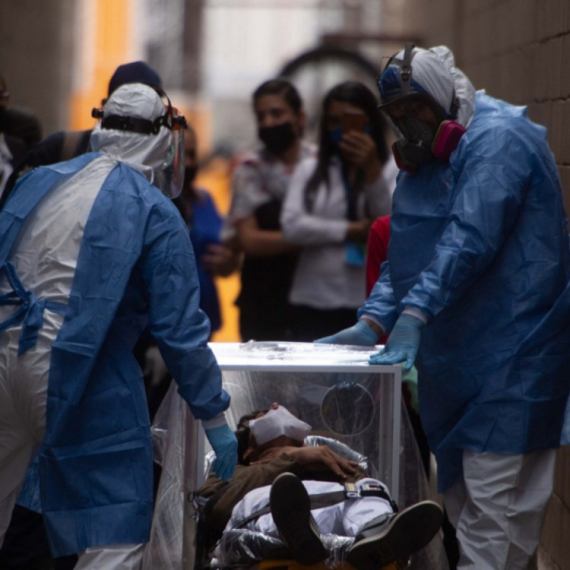World Bank creates USD 1.2bn food crisis fund
The World Bank announced a USD 1.2bn program to fight the global food crisis, including USD 200mn in grants to poor countries facing the most dire needs.
Friday, 30.05.2008.
09:21

The World Bank announced a USD 1.2bn program to fight the global food crisis, including USD 200mn in grants to poor countries facing the most dire needs. The new program aims to speed up aid to those in need as "high food prices are making the bottom billion (people) into potentially the bottom two billion," World Bank president Robert Zoellick said. World Bank creates USD 1.2bn food crisis fund The Bank also said it would boost its overall support for global agriculture and food to USD 6bn next year, up 50 percent. Crop insurance and other assistance for small farmers in developing countries also will be part of the program, Zoellick said in a media teleconference from the sidelines of the Tokyo International Conference on African Development. In preparation for a UN-sponsored food crisis summit in Rome next week, Zoellick said he has emphasized "the need for a clear action plan." Skyrocketing commodity prices in the past year have battered developing countries, where food takes the lion's share of household income. Rising food prices have sparked deadly unrest and rising malnutrition, and a number of countries have put limits on exports to try to feed their own populations. Zoellick, a former top US trade official who has made agriculture a priority since taking the helm of the poverty-fighting bank last July, said the new program was aimed at supporting coordinated international efforts. More than 150 countries agreed to a "new deal" for global food policy at the spring meetings of the World Bank and International Monetary Fund in April. The new USD 1.2bn rapid-response facility supports safety-net programs such as food for work, conditional cash transfers, and school feeding for the most vulnerable. It also provides support for food production by supplying seeds and fertilizer, improving irrigation for small farmers, and providing budget support to offset tariff reductions for food and other unexpected costs, A USD 200mn trust fund for the most vulnerable will come from income from the bank's International Bank for Reconstruction and Development. The World Bank approved the first grants from the trust fund for Liberia, Haiti and Djibouti on Thursday, with Liberia and Haiti receiving USD 10mn each and Djibouti USD 5mn. "What's urgent and key," Zoellick said, "is that we immediately respond to the terrible human needs of the present crisis ensuring that millions don't fall into this process again but also that we build a production response so we can transition this into an opportunity so we can make the African farmers help not only feed Africa, but people around the world." Oxfam International's senior policy adviser, Elizabeth Stuart, welcomed the announcement. "The World Bank has shown impressive leadership on the food crisis in the last few weeks," she said. "We need to see similar political momentum and serious response from next week's meeting in Rome." US Agriculture Secretary Ed Schafer, who will lead the US delegation to the three-day FAO world food security conference that opens Tuesday in Rome, said he would propose biotechnology as a strategy to boost agricultural production. According to a study released Thursday by the US General Accountability Office, agricultural productivity in sub-Saharan Africa, as measured by grain yield, is only about 40 percent of that of the rest of the world's developing countries, and the gap has widened over the years.
World Bank creates USD 1.2bn food crisis fund
The Bank also said it would boost its overall support for global agriculture and food to USD 6bn next year, up 50 percent.Crop insurance and other assistance for small farmers in developing countries also will be part of the program, Zoellick said in a media teleconference from the sidelines of the Tokyo International Conference on African Development.
In preparation for a UN-sponsored food crisis summit in Rome next week, Zoellick said he has emphasized "the need for a clear action plan."
Skyrocketing commodity prices in the past year have battered developing countries, where food takes the lion's share of household income.
Rising food prices have sparked deadly unrest and rising malnutrition, and a number of countries have put limits on exports to try to feed their own populations.
Zoellick, a former top US trade official who has made agriculture a priority since taking the helm of the poverty-fighting bank last July, said the new program was aimed at supporting coordinated international efforts.
More than 150 countries agreed to a "new deal" for global food policy at the spring meetings of the World Bank and International Monetary Fund in April.
The new USD 1.2bn rapid-response facility supports safety-net programs such as food for work, conditional cash transfers, and school feeding for the most vulnerable.
It also provides support for food production by supplying seeds and fertilizer, improving irrigation for small farmers, and providing budget support to offset tariff reductions for food and other unexpected costs,
A USD 200mn trust fund for the most vulnerable will come from income from the bank's International Bank for Reconstruction and Development.
The World Bank approved the first grants from the trust fund for Liberia, Haiti and Djibouti on Thursday, with Liberia and Haiti receiving USD 10mn each and Djibouti USD 5mn.
"What's urgent and key," Zoellick said, "is that we immediately respond to the terrible human needs of the present crisis ensuring that millions don't fall into this process again but also that we build a production response so we can transition this into an opportunity so we can make the African farmers help not only feed Africa, but people around the world."
Oxfam International's senior policy adviser, Elizabeth Stuart, welcomed the announcement.
"The World Bank has shown impressive leadership on the food crisis in the last few weeks," she said. "We need to see similar political momentum and serious response from next week's meeting in Rome."
US Agriculture Secretary Ed Schafer, who will lead the US delegation to the three-day FAO world food security conference that opens Tuesday in Rome, said he would propose biotechnology as a strategy to boost agricultural production.
According to a study released Thursday by the US General Accountability Office, agricultural productivity in sub-Saharan Africa, as measured by grain yield, is only about 40 percent of that of the rest of the world's developing countries, and the gap has widened over the years.






















Komentari 0